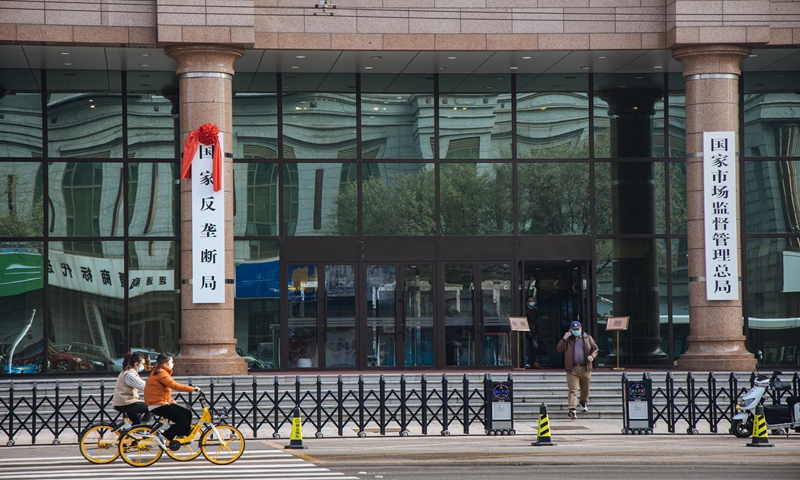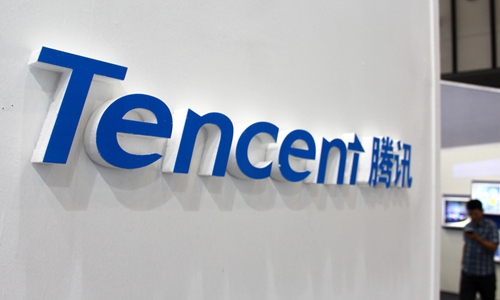China's top market regulator releases guidance for enterprises on overseas anti-monopoly compliance
Monopolistic market practices will be scrutinized, dealt with

China's anti-monopoly bureau officially launches on November 18, 2021. It's located in the same building as the country's top market regulator, the State Administration of Market Regulation, in Beijing. Photo: Li Hao/GT
China's newly established National Anti-monopoly Bureau on Thursday inaugurated its office in downtown Beijing, marking a new chapter of the country's intensifying efforts to rein in companies' monopolistic practices to maintain free competition of the market.
In line with the country's growing focus on antitrust regulations both at home and abroad, China's top market regulator also on Thursday released a guidance document for enterprises on anti-monopoly compliance.
The establishment of the anti-monopoly bureau will push for fair competition, so as to promote continuous improvement of business environment for more than 150 million market players in China, and open up broader space for private enterprises to develop, analysts said.
In the past three years, China has investigated and handled 345 cases of monopoly, 37,000 cases of unfair competition, and concluded over 2,000 cases of concentration of business operations.
The guidance explained overseas anti-monopoly compliance management system, the focus of overseas anti-monopoly compliance risks, and antitrust risk management, read the document published by the State Administration of Market Regulation (SAMR) on Thursday.
Analysts said that the guidance could be a gift to companies, especially in the private sector. With more Chinese companies going global, understanding of international antitrust practices is a crucial area of due diligence.
The guidance also explained antitrust actions in various jurisdictions including monopoly agreements, definition of abuse of dominant market position, specific content of concentration, methods of antitrust investigation overseas, rights of enterprises in overseas antitrust investigations, and foreign antitrust lawsuits.
The move is a preparation for the integration of China's antitrust practice with international standards. Transnational anti-monopoly efforts could be one of the areas of cooperation between China and the US, and potentially Europe too, said analysts.
Many Chinese digital companies are competitive in the global scope. It is very common that their business operations cover overseas users, which means that they will come under the supervision of overseas antitrust regulators, Wang Peng, an assistant professor at the Gaoling School of Artificial Intelligence at the Renmin University of China, told the Global Times on Thursday.
Companies may face severe penalties from the host country if they are not familiar with antitrust regulations and laws, and cannot actively circumvent illegal practices. In turn, this will have a negative impact on the international development of related domestic industries.
The new guidance is applicable to Chinese enterprises operating abroad and those engaged in business operations in China that may have an impact on overseas markets.
The affected business scope covers import and export trade, overseas investment, mergers and acquisitions, transfer or licensing of intellectual property rights, bidding and tendering, and other business activities overseas.
The issue of the guidance could be linked to the fact that China is applying to join the Digital Economy Partnership Agreement (DEPA) and the Comprehensive and Progressive Agreement for Trans-Pacific Partnership (CPTPP), Hu Qimu, chief research fellow at the Sinosteel Economic Research Institute, told the Global Times on Thursday.
"It is expected that there may be a multilateral anti-monopoly mechanism in the future, which is an inevitable result of the development of the global digital economy, and also conducive to regulating the development of the digital economy," Hu noted.
China has signed 55 anti-monopoly cooperation documents with 33 countries and regions, and jointly handled dozens of major monopoly cases, according to official statistics.
As the world has entered the digital economy era, the global flow of resources including data is more active. The global operations of internet companies are difficult to be effectively supervised by a single country, said analysts.
According to the guidance, some jurisdictions define different degrees of criminal responsibility for anti-monopolistic actions. Individuals involved in monopolistic behavior, such as senior managers and those directly responsible, potentially face fines or even imprisonment, with penalties of up to $100 million for corporate offenders and criminal fines of up to $1 million for individuals and a maximum prison term of 10 years.
Should illegal gains or the victim's economic loss exceed $100 million, the company can be fined up to twice that amount.
The most recent example was Google, which lost a challenge against EU antitrust rulings and was handed a $2.8-billion fine last week, media reports said.



